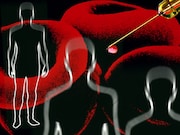Bolus plus two-hour infusion of andexanet alfa cuts antifactor Xa activity by 92 percent
MONDAY, Feb. 11, 2019 (HealthDay News) — The reversal agent, andexanet alfa, effectively reduces life-threatening bleeding in patients treated with factor Xa inhibitors, according to a study published online Feb. 7 in the New England Journal of Medicine to coincide with the American Stroke Association International Stroke Conference, held from Feb. 6 to 8 in Honolulu.
Stuart J. Connolly, M.D., from McMaster University in Hamilton, Ontario, Canada, and colleagues evaluated 352 patients (mean age, 77 years; 80 percent atrial fibrillation) treated for acute major bleeding within 18 hours after administration of a factor Xa inhibitor. Patients were treated with either low-dose (400 mg bolus plus 4 mg/minute infusion for two hours) or high-dose (800 mg bolus plus 8 mg/minute infusion for two hours) andexanet based on type, timing, and amount of the last factor Xa inhibitor dose.
The researchers found that bleeding was intracranial (64 percent) or gastrointestinal (26 percent). Following the andexanet bolus, median antifactor Xa activity decreased from 149.7 ng/mL at baseline to 11.1 ng/mL (92 percent reduction) in patients who had been treated with apixaban and from 211.8 to 14.2 ng/mL (92 percent reduction) in patients who had been treated with rivaroxaban. Eighty-two percent of the patients evaluated achieved excellent or good hemostasis within 12 hours after completion of the infusion. Death and a thrombotic event occurred in 14 and 10 percent of patients, respectively, within 30 days. Overall, reduction in antifactor Xa activity was not predictive of hemostatic efficacy, but it was modestly predictive in patients with intracranial hemorrhage.
“The study supported the May 2018 U.S. Food and Drug Administration approval of andexanet alfa, now the only approved agent for patients taking rivaroxaban and apixaban when urgent reversal is needed for life-threatening or uncontrolled bleeding,” a coauthor said in a statement.
Several authors disclosed financial ties to pharmaceutical companies, including Portola Pharmaceuticals, which manufactures andexanet alfa and funded the study.
Copyright © 2019 HealthDay. All rights reserved.








